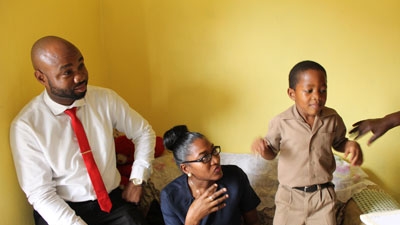“When we met her, Patricia was such a sickly and small child. I didn’t even know if she would live to see the next week.” remembers Elaine Burke. “To see here today, she [Patricia] couldn’t have done better for herself: she went to university, got married, had a child, and has a good, well-paying job.’”
In a region plagued by inequality, the odds were certainly not in Patricia’s favor. A child’s outlook varies wildly according to where and to whom they were born. So, what could have brought about such a dramatic change?
The answer is found in some of the simplest every-day objects: a bottle filled with stones to be used a rattle, a piece of cardboard folded into a block, or a simple picture book. On the surface they may not be much, but in the hands of a parent or carer such objects stimulate the child’s development, teaching them life-long language and motor skills.
“The toys we took to Patricia,” explained Burke, “were part of her development.”
Earlier = better
A child doesn’t start learning when he or she reaches school. Instead, the foundations for life-long development and learning are laid during their first five years of life. By the time they reach school age, around 85% of their brain has already developed.
What’s more, half of their cognitive capacity is influenced by their environment. As such, for any effort to make the most of those early, impressionable years to be successful, parental participation is key.
Such was the premise of a 2 decade-long study at the University of the West Indies.
In 1986, Elaine Burke and other health professionals visited infants in some of Kingston’s poorest neighborhoods to encourage parents to play with their children. With home-made toys and simple words of praise, they set out to boost the children’s intellectual and emotional development, following their progress over the years. More than 2 decades later, the benefits of this early engagement are still being felt.
Not only did those children whose parents had played with them have higher IQs, have done better in school and were less likely to be involved in violent behavior and, the researchers discovered they were also earning up to 25% more than children who weren’t involved in the project.
“As they got older, other benefits started to emerge to their education and also to their mental health” described Professor Walker, who led the most recent study. “They showed less depression, better self-esteem, less withdrawal, fewer social inhibitions. In other words, a whole new suite of skills that would be important for functioning as adults.”
It’s a remarkable discovery, which serves to further highlight the importance of efforts to boost early-childhood education region-wide.

